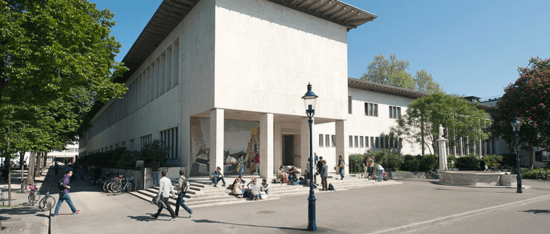
«For motivated health professionals interested in an academic career or a leadership position in healthcare delivery, policy or management.»
The INS offers a stimulating and supportive environment for motivated health professionals interested in earning a PhD.

One-on-one expert supervision
Each PhD student has a primary and secondary supervisor, both of whom guide and mentor them on a regular basis. Depending on the phase of their PhD, they meet with these supervisors up to once per week. As part of a research group, each PhD student receives numerous opportunities for scientific discussion, interaction and feedback.

Research infrastructure
The INS supports PhD students comprehensively during research projects. In addition to the services provided at the University and Faculty levels, the INS provides its own <link de/doktorat/infrastructure/>research infrastructure</link> for PhD students in Nursing Science.

Educational platforms
All INS PhD students have access to the Swiss PhD Platform in Nursing Science Education SPINE, an educational platform shared by the INS and the University of Lausanne. In addition, doctoral students are invited to participate in the University of Basel’s PhD Programme in Health Sciences PPHS, an interdisciplinary doctoral programme open to all students in health related fields such as Medication Development, Epidemiology, Clinical Research, Nursing Science and Sports Science in the Faculty of Medicine.

Renowned faculty
All senior INS faculty have international track records, including past or ongoing appointments at universities in the US, Australia or Europe. Reflecting their ample experience, including numerous large cohort studies, their research has been published in leading interdisciplinary journals. They serve as editors, co-editors or members of various editorial boards and have been granted multiple fellowships.
INS employees

Employee status
As all INS PhD students hold positions at the University of Basel, they receive University employee benefits.

Clinical relevance and impact
Relevance and impact are key criteria in all INS education and research. Either at a system level or that of individual patient care, our focus is always on improving clinical care. Therefore, PhD projects are highly clinically relevant. Often students opt to keep a clinical role during their studies, which helps to maintaining the connection to the clinical field.

Access to clinical research fields through ASPs
The INS has established multiple academic service partnerships ASPs with a number of clinical institutions such as the University Hospital Basel. These partnerships allow staff from our clinical partners to develop academically, while providing our PhD students opportunities to conduct research and form contacts across a broad range of settings.

Interdisciplinarity
PhD committees are often comprised of faculty from various disciplines, allowing development of research projects relevant to patients, nurses, physicians and other relevant groups.

Access to international networks
INS research collaborations span the world from Leuven to Maastricht, from Sidney to Boston, from Bozen to Beirut.

Multiple research methods
The methods follow the research question. As appropriate to the research context, INS faculty and staff support doctoral students comprehensively to develop and maintain expertise in quantitative, qualitative and mixed-method data collection and analysis. Since our aim is to improve clinical practice we often apply implementation science methods.
